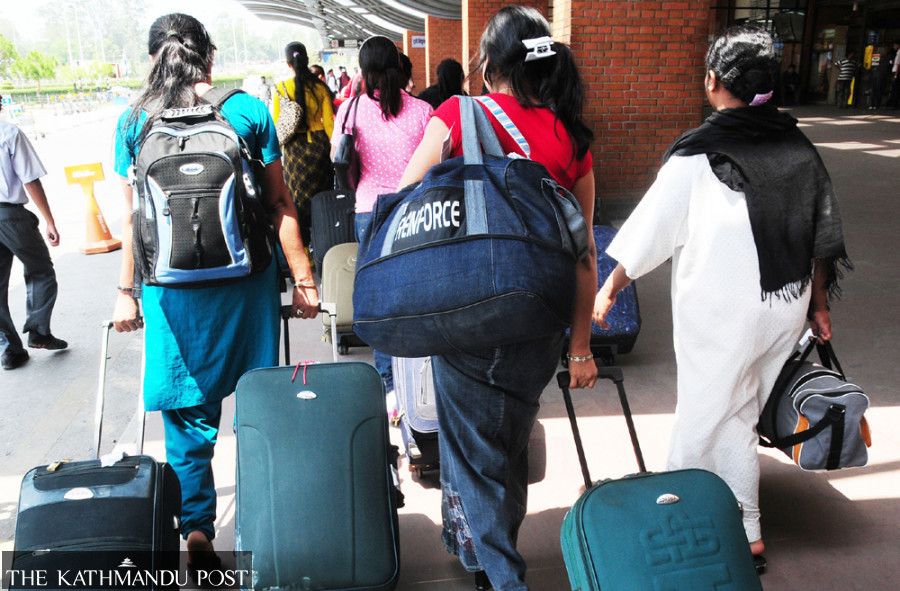National
Foreign employment board is taking up duty of training outbound women
Candidates can still choose between the board and private firms for the training, which helps them learn about the destination countries and their cultures and rules.
Chandan Kumar Mandal
The government is making preparations to provide pre-departure orientation training, which is mandatory for all migrant workers, to outbound women workers from the new fiscal year. Until now only private sector agencies have been providing such training.
The Foreign Employment Board, the government agency responsible for the welfare of Nepali migrant workers, including the management of pre-departure training, has said it is making preparations for training women workers.
According to Rajan Prasad Shrestha, executive director with the Foreign Employment Board, the board has come up with a plan to conduct pre-departure orientation for women migrant workers.
“The board has already been paying for the pre-departure training of female migrant workers. But now the board plans to conduct such training on its own,” Shrestha told the Post. “We are trying to implement the plan as a trial at first and see the possible challenges we might face in the future.”
Pre-departure orientation training is compulsory for all Nepali migrants going on foreign employment. Through a two-day training, aspiring migrant workers receive useful information about the host country, its rules and regulations, traffic laws, labour laws and local culture and traditions, among others. The training aims to make their stay at the workplace and in the host country safe and easy.
While male migrant workers have to pay for the pre-departure orientation training provided by private agencies, the board reimburses the Rs700 training fee paid by female migrant workers.
“The board is responsible for preparing the curriculum and guidelines for pre-departure training. We also develop the training manual and provide training to trainers. Therefore, the board can try conducting pre-departure orientation on its own,” said Shrestha. “We can ensure that the women workers receive the best training as high-quality training can better protect women migrant workers, who are vulnerable to abuse and harassment in foreign employment.”
Pre-departure orientation training is considered one of the most significant phases of labour migration. However, questions have been raised on the training’s failure to prepare and protect migrant workers from the challenges they face in labour destination countries.
Taking these concerns into consideration, the board recently upgraded the curriculum of the orientation training, making it country-specific unlike in the past when all outbound migrant workers would attend the same module irrespective of the countries they were migrating to.
The board aims to start conducting pre-departure training for women migrant workers from the first quarter of the new fiscal year. It is already working on managing the required logistics for the training.
“As we already have all the guidelines, updated curriculums and training modules, all we need now are some trainers and a space to conduct the training. We have a hall, but we might need more space because pre-departure trainings need to be conducted separately for country-specific migrants,” said Shrestha. “We are also looking for more trainers. As per the updated curriculum, the training should not only be delivered in lectures but also through an audio-visual medium.”
The board meeting of the board secretariat on July 6 has also approved the budget for the purpose. According to Shrestha, the budget will be spent on paying rent for the space and salaries to trainers.
Once the preparations are completed, the board will be issuing a public notice asking women migrants to enrol for the training. However, the option of receiving orientation training from private agencies will still be open for them.
“Private sectors can still conduct pre-departure training for women migrant workers. However, we will be requesting them to send women attendees to the training conducted by the board. The option of a refund for women migrant workers will still be available if they choose to go to private agencies for orientation,” said Shrestha. “Getting pre-departure training from the board will establish a long-term connection between women migrants and the board, which will ensure their safety and provide them immediate support whenever they need help.”




 9.7°C Kathmandu
9.7°C Kathmandu














